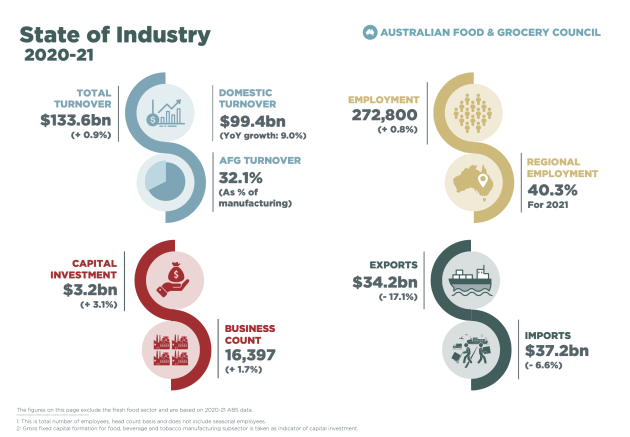Australia’s $133.6 billion food and grocery manufacturing industry recorded a 0.9 per cent increase in turnover in 2020/21, despite a 17.1 per cent fall in the value of its exports, the latest State of the Industry report by the Australian Food and Grocery Council (AFGC) found.
AFGC CEO Tanya Barden said while the sector was strong during the pandemic and workplace disruptions, the pandemic, war in Ukraine and supply chain disruptions have weighed on the growth outlook and stoked inflation.
“These figures predate the unprecedented impacts of this year’s heavy flooding in eastern and central Australia, as well as the war in Ukraine. The pressures manufacturers were facing a year ago have intensified to the point where the viability of some businesses could be at risk,” Barden said.
Report findings:
- Australian food and grocery manufacturing rose in value to $133.6 billion in 2020/21 despite COVID-19 pandemic disruption;
- stocking up and panic buying helped drive a spike in domestic spending – up nine percent to $99.4 billion;
- local stocking up and panic buying offset a 17.1 percent fall in exports;
- pharmaceutical products turnover rose 50 percent to $2.21 billion;
- imports fell 6.6 percent to $37.2 billion
- China remains the largest export destination for food, beverage and grocery exports (worth $7.3 billion);
- largest increase in exports was to Vietnam, up 13.8 percent to $796 million;
- since 2020/21 major floods in Australia and war in Ukraine have worsened the challenge for a stressed industry;
- food and grocery manufacturing accounts for 32.1 percent of all Australian manufacturing activity, making it the largest manufacturing sector; and
- employment in food and grocery manufacturing increased 0.8 percent to 272,800 people, with 40.3 per cent of the workforce in regional areas.

Barden said now is the time to invest in new skills, technologies and infrastructure to build industry resilience.
“The federal government has shown it understands the importance of supporting Australia’s competitive strengths, identifying food processing among the priority areas for its National Reconstruction Fund,” she said.
The AFGC’s Sustaining Australia: Food and Grocery Manufacturing 2030 report outlines a plan to develop the industry as a major economic driver for Australia by boosting value-added production, lifting its value to $250 billion and increasing industry employment to 427,000 people by 2030.
“Investment in Australia’s food and grocery manufacturing industry is an investment in the future and our sovereign manufacturing capacity.”






